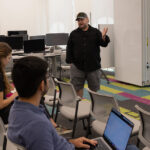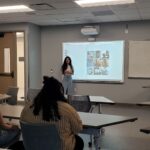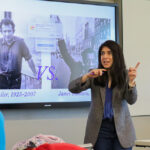
Texas A&M-University Regent Elaine Mendoza prompted an audience Monday to consider the number of societal roles women share, plus new educational roles they should challenge themselves to take on, including the confidence to ask — and answer — questions in the classroom.
“We all need to be on the same page,” Mendoza said, introducing the topic of women’s empowerment to an audience of approximately 30 women and six men.
Mendoza spoke in celebration of Women’s History Month, which is celebrated nationally during March. This year’s theme is Women’s Education and Women’s Empowerment. The event was sponsored by the University library and office of student engagement and success in Room 238 of Main Campus Building.
A native of San Antonio, Mendoza said she graduated from Holmes High School and went on to receive her degree in aerospace engineering at A&M-College Station. According to the A&M-University System website, she is also the founder, president and CEO of Conceptual MindWorks, Inc. (CMI), a biotechnology and medical informatics company, established in 1990.
Mendoza serves on the Board of Directors of the Texas Research Park Foundation, the San Antonio Area Foundation and The Texas Technology Development Center. She is also a member of the P16Plus Council of Greater Bexar County and a Board member of Generation Texas San Antonio.
Tracing her story of success, Mendoza said there were just a handful of women studying aerospace engineering as an undergraduate. Although she felt like she was the only one who didn’t understand the material, she said she developed the courage to ask questions.
She said a good way for her to move forward in her own education was to “ask stupid questions, though we know there’s no such thing.”
Good questions led to a better educational experience for everyone in the classroom, she said. She learned she wasn’t the only one in the room who didn’t understand. And her male classmates benefited from questions she found the confidence to ask.
“Women are changing the environment of the classroom,” Mendoza said, encouraging faculty and staff to encourage more interaction.
From an industry standpoint, Mendoza said that women “have to get in there and solve different problems.” She explained that women have different responsibilities, and therefore, bring different ideas — and a different lens — to the marketplace.
She highlighted accomplishments by women engineers and scientists that illustrate why women are valuable contributors. For example, Mendoza attributed the minivan to a woman engineer, designed and manufactured to help families cart kids around to school and athletic events. She also said it was an enterprising and multitasking woman who created the first palm pilot.
“Not to say one is better,” Mendoza said of women and men. “It’s to say we need each other.”
Empowering women students
Mendoza said she serves on a national task force to bring more minorities and women in science, engineering, medicine and technology. The task force focuses on getting minorities and women into the workforce by going back to the classroom starting in Pre-K to ensure minority and women students are getting what they need to improve in math and science.
“We have a lot of work to do,” Mendoza said. “We are behind in the state and behind in the country, particularly in the STEM fields.”
She said studies found that young women in middle school want to do something to make a difference, but from their perspective didn’t see how science and engineering could accomplish that. Mendoza emphasized how technology has changed the world.
She said that having A&M-San Antonio on the South Side is “tremendous” and called the institution’s personnel and students “pioneers on the South Side.”
“You have the option to change higher education,” she said, addressing non-traditional students.
“You guys are heros,” she added and encouraged students to do the best they can and graduate.
“We need you to be successful,” she said adding that students don’t have to get a 4.0. “Just graduate.”
She noted the importance of educated women in the political arena to initiate the needed change.
“Are we really a democracy when only 10 percent vote?” she asked. “Let’s make sure that we create a generation of people who will get involved in democracy … or we will lose our democracy.”
In their own words
Audience members were asked by The Mesquite in follow-up interviews to reflect on subjects addressed by A&M Regent Elaine Mendoza. This is the first in a series of new reports that connect directly with the campus community and allow individuals from different backgrounds to share their own insights and stories.

Lilibeth Arencibia, sociology senior
In my first semester of college, I was attending community college in my hometown of New York City. A professor encouraged me to get involved with student events. Of the presentations I participated in, the majority were statistic-based; none have focused on women’s empowerment and motivation, and that’s what I’ve been seeking. Regent Mendoza, however, was a very powerful speaker. I felt she spoke to me personally. I work a part-time job, volunteer an average of an hour a day, five days a week, and take care of my ill mother.
Sometimes I try to get creative with my schedule and bring my mother along to campus; she’ll wait in the library while I’m in class. She can’t drive and relies a lot on me. It becomes easy to get lost in the jungle of college with transferring and having to take more classes than what was required in New York.
Sometimes it gets a bit overwhelming. I question whether the time I’ve invested will pay off, but Mendoza’s reply of “just graduate” to my question of how to cope with everything was a relief. As the youngest of three, and the only female, I feel that shaped me because it’s kind of a gender role. I think that trait carried over to what I want to study. I’m a sociology major, and I’m not sure of what I want to do with that degree, but I know I want to help people.
I was also really inspired when Regent Mendoza spoke about getting younger females into the fields of science and mathematics. I remember when my middle school teachers said women have to try to go into computers or other technical fields, but we declined. We really did try to steer away from fields in which we could have been successful. But we went away from those choices because it wasn’t seen as “cool.”
When Regent Mendoza said that middle school female students do just this, it made me wonder what I was truly capable of, and what would have happened if I would have listened to the guidance of my former teachers. I do volunteer work for children. I always want to instill in them what is important. I want to tell them: “If you have an interest in something, do it.”
I think another question I wanted to ask Mendoza is if she had a mentor. I had one in high school. I want to lead by example by mentoring the children I volunteer for. My devotion increases grades, builds trust and helps young women to be happier with themselves. Children learn very quickly. Confidence should be one of the traits they learn early in life.
– As told to Mesquite Reporter Vanessa M. Sanchez
vanessam.sanchez@jaguar.tamu.edu
In a Q-and-A session following Mendoza’s talk, Dr. Albert Valadez, chair for leadership and council, asked what Mendoza’s advice would be to women and others when phrases like the “War on Women” are used in the media.
The phrase is used in reference to Republican proposed congressional bills and measures which groups, such as WinwithWomen2012, argue restrict a woman’s access to a full range of reproductive health care, including attempts to defund Planned Parenthood and other family planning services.
In Texas, the Austin American Statesman announced that the federal government will stop funding a Texas health program that serves 130,000 low-income women because of a state law that bars abortion-affiliated clinics from getting public money.
Some say that the issue should not be a part of the election, but others are using the “war on women” as a political platform.
In response to Valadez’s question, Mendoza said that voters shouldn’t be swayed by soundbites they hear, and everyone should make sure they understand every issue.
“Get involved and vote at the booth,” she said. “We’re all in this together and we have to make it work,” she said.
Dr. Albert Valadez, chair for leadership and council:
I thought her answer to my question about the phrase “War on Women” was on target. Voters should be educated on the topic and not be swayed by soundbites.
There’s a tendency for politicians to say things to get people to vote for them. I encourage students to stay away from cable news networks and look at credible publications and explore all issues.
Students should also form their own ideas of objective information. Once you have the facts, form a conclusion and let that be your force to make an educated vote.
– As told to Mesquite Reporter Melody Mendoza
melody.mendoza@jaguar.tamu.edu

Arlene Seglvia, education junior
I liked the focus on empowering women. No matter what, our voices should be heard. Women are often too quiet in male dominated surroundings instead of asking questions and voicing their opinions.
I also agreed with women going towards their goals and dreams such as receiving a higher education and never stopping or giving up. She said failure is not an option. We must define our success and who we are.
We need to help young women know it’s okay to like math and science or any other area they think is reserved for boys. There are still several jobs that I think some women see as just for men, such as politics or high power positions in corporations. The media even displays women this way.
There are still several strong women who climb the ladder, but if we continue moving forward, we could reach dominance in these areas.
I don’t remember my teachers ever telling us that everyone can become whoever they want. My parents are the ones who encouraged me and pushed me to pursue my dreams.
Young women in middle school are in limbo and it is usually the parents who are relied upon to guide their children.The lower social class focuses more on nurture, whereas higher educated people encourage and push for greater expectations.
My parents attempted college but never finished an associate’s degree because family got in the way. My mother could have continued on, but she wanted to contribute to the household.
They regret not finishing and encourage me to obtain my higher education.
I think Mendoza’s main point was to speak your voice, ask questions, and always be prepared with the facts.
She provides a great example. She has her own company and is still able to manage a family. She is one of many women we should look toward as we consider who our role models should be.
– As told to Mesquite Reporter Shawna Mount






